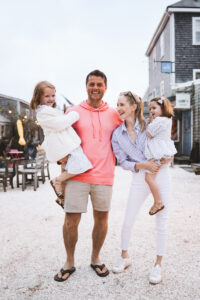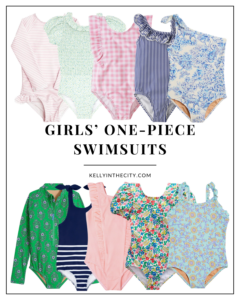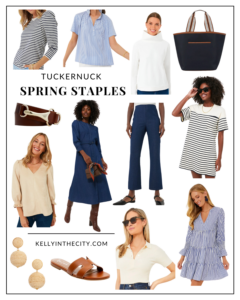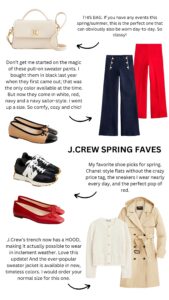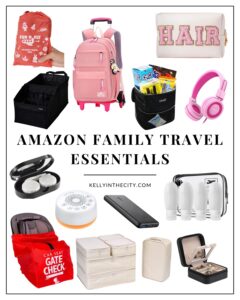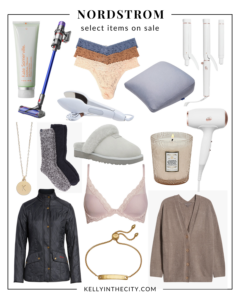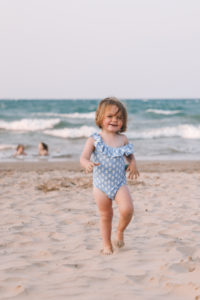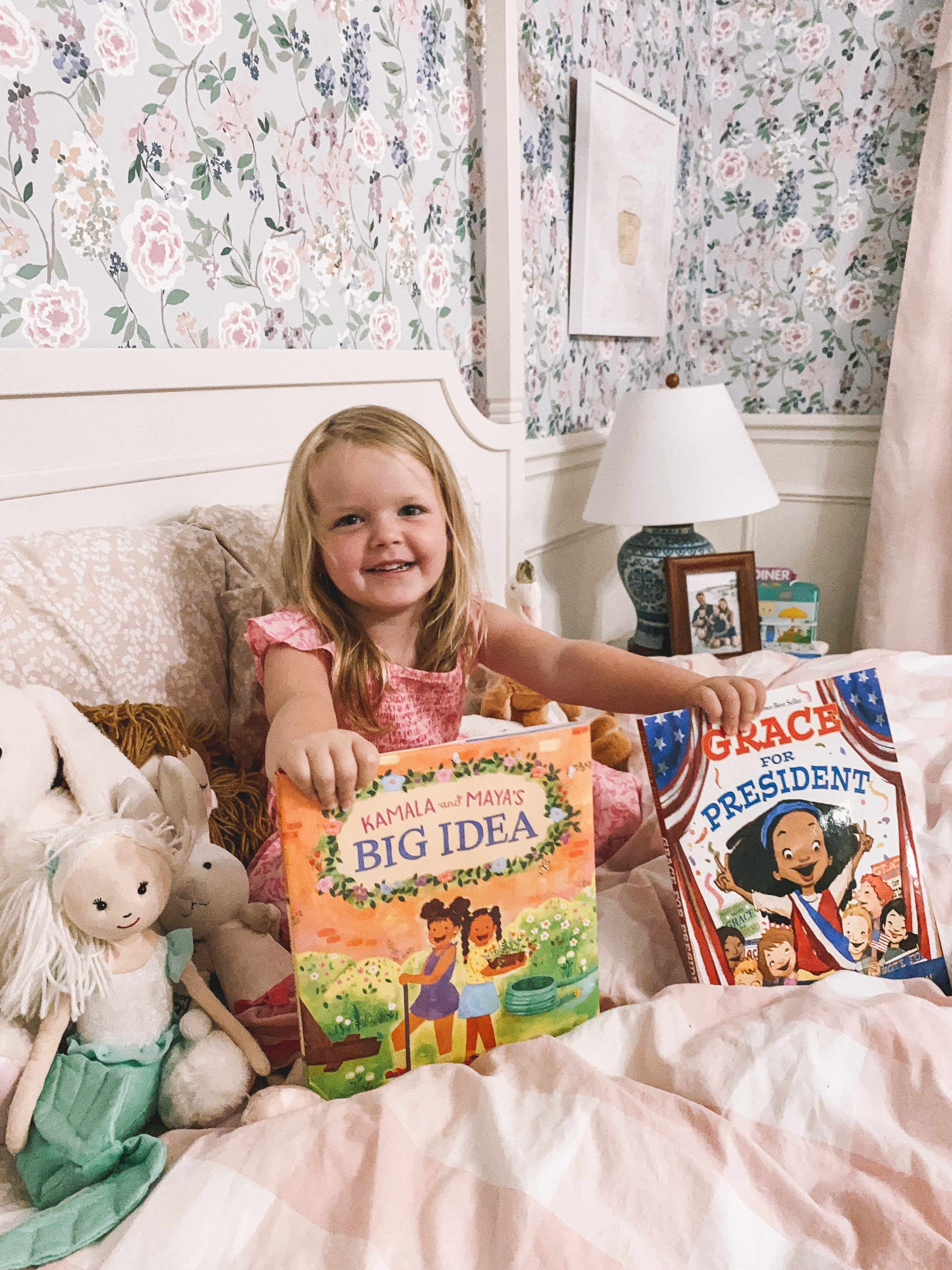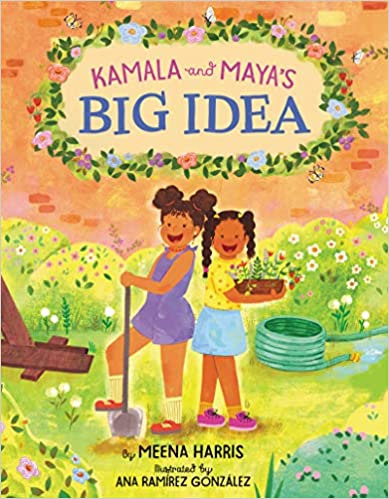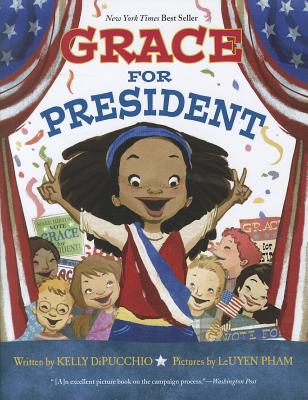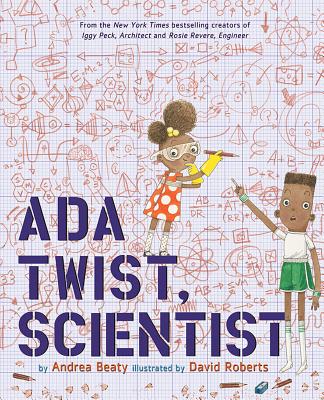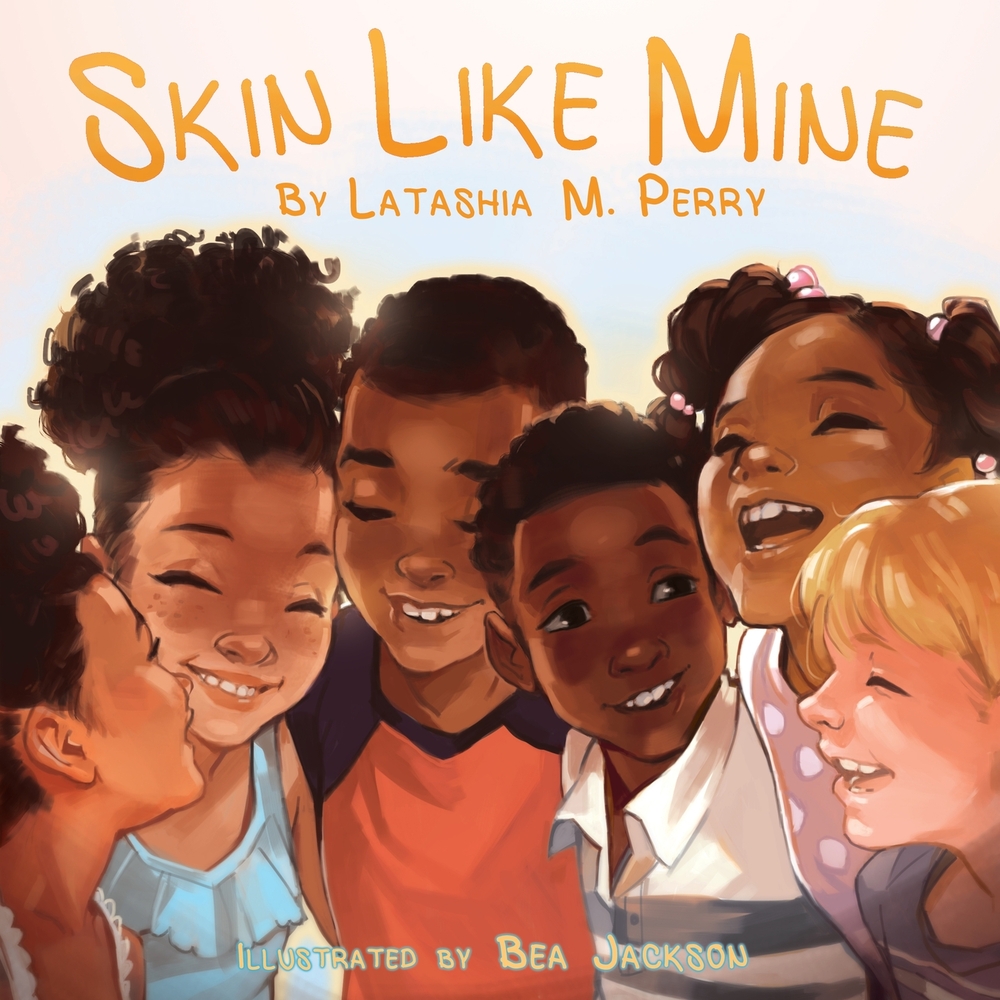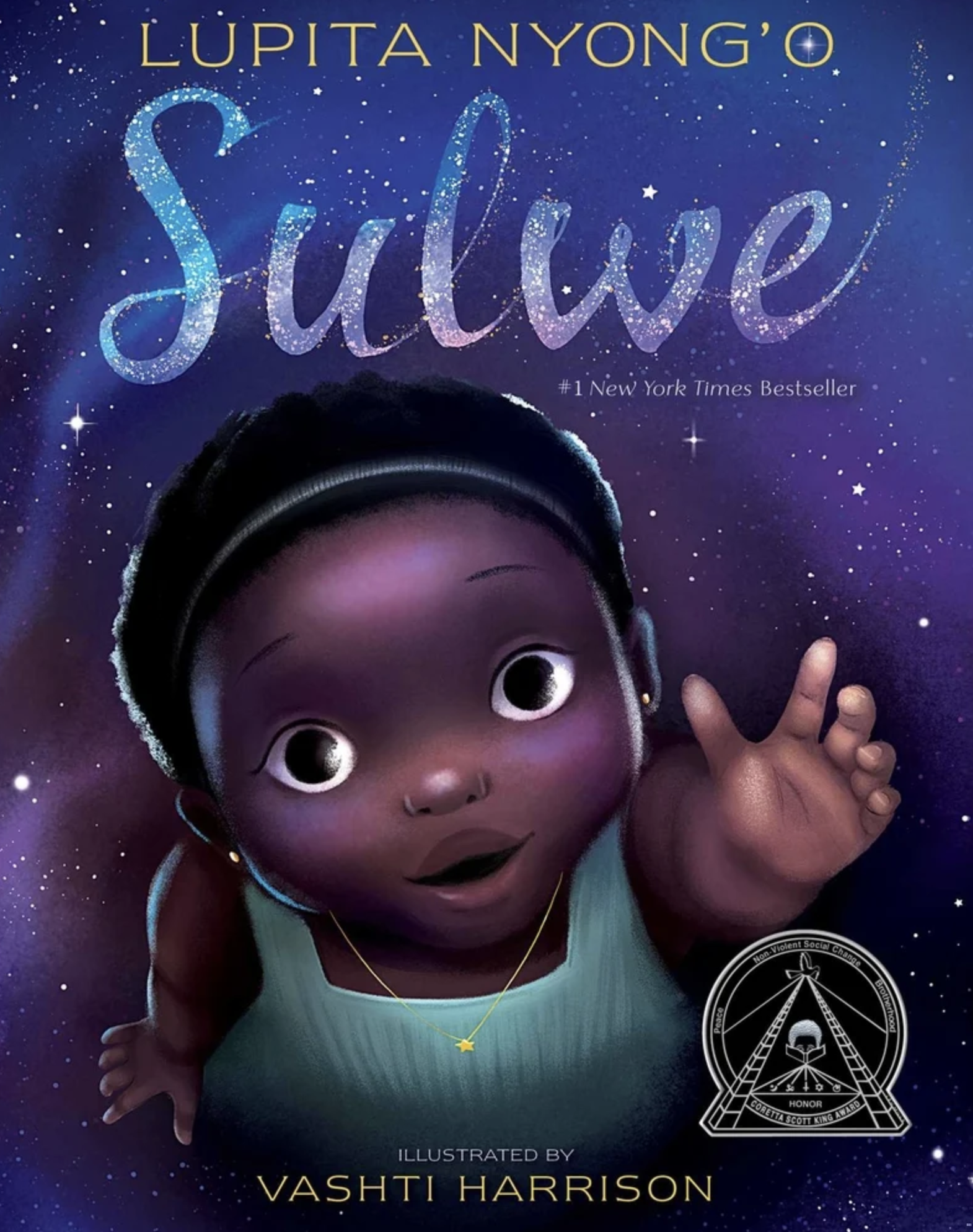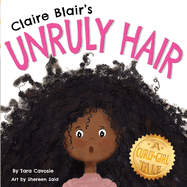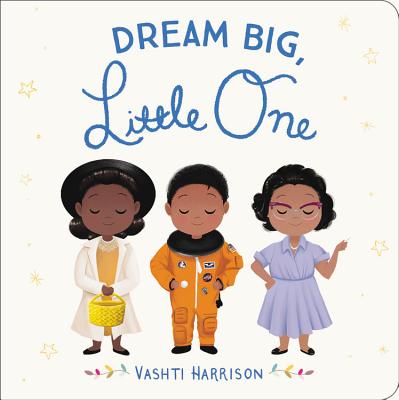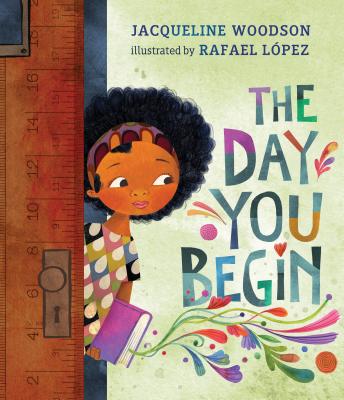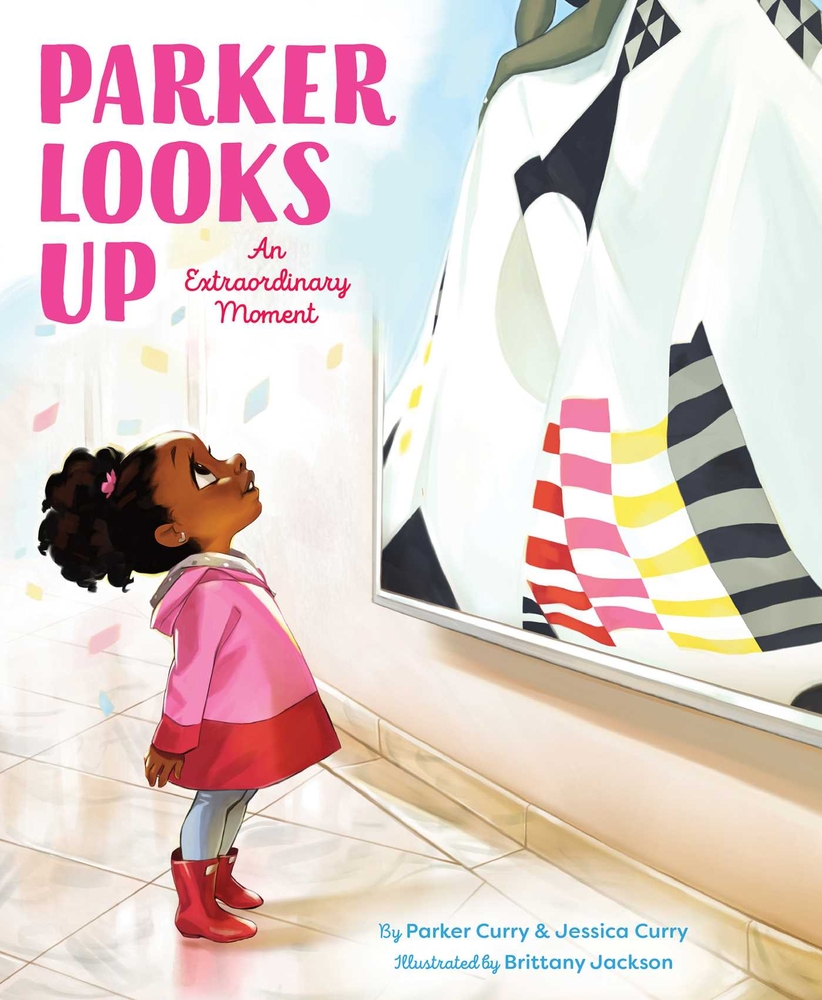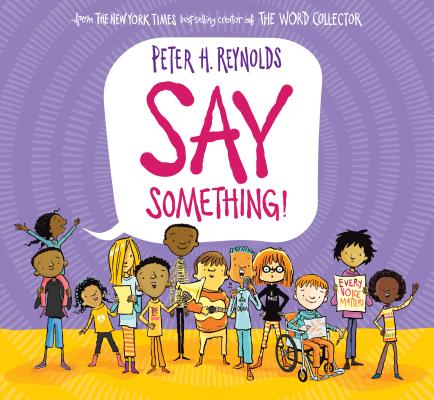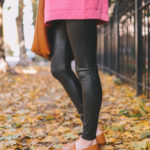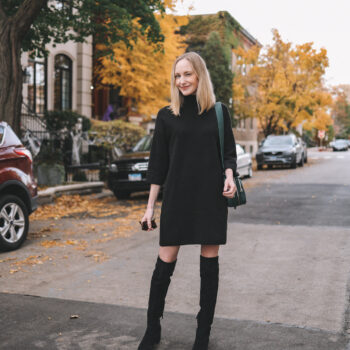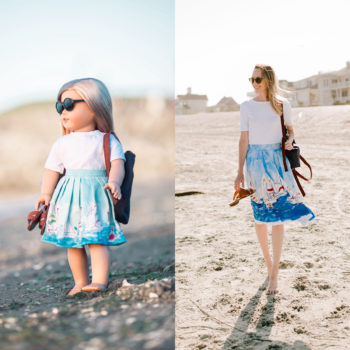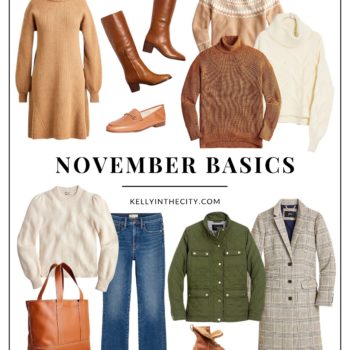Kamala and Maya’s Big Idea / Grace for President / Emma’s Room Tour
2020 has been a rough year, but I’m grateful for the lessons it’s taught me. One of them has been the importance of continually fighting for the Black community by educating myself; teaching my children to be better; backing great causes; supporting Black-owned businesses; amplifying the voices of Black colleagues, family and friends; diversifying my life; voting; and speaking up.
Over the last few months, Mitch and I worked to diversify our children’s library. We spent a lot of time researching and carefully selecting reading material for our daughter Emma, and while it’s certainly made a marked impression on her, it’s deeply impacted us, too! We’ll always have a lot of work to do, but I can’t believe how much more mindful we now are. Raising antiracist children should be at the forefront of our minds–forever.
A few things before I share our favorite titles:
- These books are the ones that our daughter, Emma, enjoyed most. (In case you’re new here, she’s four years old and an incoming pre-k 4 student in the Chicago Public Schools system.) In no way is this a comprehensive list, and I know that what resonates with Emma may not resonate with other children. Still, I think a lot of good can come from sharing our favorites. Perhaps parents will discover new books they’d like to introduce to their own libraries, or maybe they’ll go down the rabbit hole and find others?! And hopefully we’ll receive some recommendations, too. :)
- We’re moving more slowly with finding antiracist baby books for Lucy. I’ve tried a few so far but the concepts were too complex for even Emma to grasp, never mind a one-year-old. My thinking right now is what could be most effective is simply making sure there there are diverse characters in our baby books. I’m no expert, though. If you have some insight, please weigh in! (Btw: The books in today’s post primarily feature Black characters. That isn’t to say that we’re not introducing literature that celebrates other cultures; I’ll feature those titles in a future post!)
- Please consider buying these books from Semicolon, an awesome Black woman-owned local bookstore in Chicago. We’ve been trying to regularly buy from Semicolon, and we’d love it if you would, too! You don’t need to live in Chicago to do so; the company offers online ordering. :)
- Also look into Literati. Literati is a children’s subscription box that inspires lifelong learning through expert curation. All books are approved by teachers, and so many of the titles celebrate diversity. It’s such an amazing service for overwhelmed parents who are living through a global pandemic!
- A wonderful reader named Alice says that your local library should have tons of great titles, too. What a great way to “test drive” books before purchasing! I haven’t done this yet, but I’m excited to borrow some children’s e-books from the Chicago Public Library. Thanks, Alice!
- Nervous about getting your child invested in literature that celebrates diversity, tolerance and inclusivity? I feel you. A couple of months ago, Emma really only wanted to read books with Elsa in them. But what worked well for us was a simple “rule”: Emma chooses one book during story time, and Mommy/Daddy chooses another book. She found it to be very fair, and became really excited to see what new books were being added to our library. These days, she rarely asks for Elsa books! (I find nothing wrong with Elsa, but I never thought I’d see the day. 😆)
- Please leave your own recommendations in the comment section below! I taught English for a long time, but I never taught elementary school… so I’m definitely new to this! Please: share, share, share. Whether it’s other books or authors, specific discussion questions, supplementary material, or interesting approaches–let’s learn from each other. Thank you!
Okay. Here are our favorites!
Told by Kamala Harris’ niece, Meena, this is the story of a younger Kamala and her sister, Maya, who more than anything wanted to build a playground for the children living in their building. They experience tons of roadblocks, but in the end, they realize that no one can do everything, but everyone can do something. And that’s how they’re able to make their dream into a reality. This is Emma’s favorite book right now. (#1 for sure!)
All of the books featured in this post have sparked fantastic discussion about race and diversity, but this one has probably made the biggest impact on Emma. And while it doesn’t directly confront racism, Kamala and Maya’s Big Idea introduces two young girls who don’t look like her, and portrays them as role models and everyday superheroes. No longer are Emma’s crayon drawings all of little white girls; they now include little Black girls, too… and when she plays make-believe, she’s often Kamala and Lucy is Maya instead of the normal Elsa/Anna combo. And that’s pretty great!
WOW. As November draws closer, this is a must for young children. (Probably ages 4 and up.) It teaches kids how the election will work, and it does it extremely well; I swear that Emma can now explain what electoral votes are and how they determine which candidate wins. The story is captivating and it’s quite a page-turner, too!
I mentioned this on Instagram recently, but it’s truly amazing that a four-year-old now has a connection to the election, thanks to Meena… and that she kind of understands how it works, thanks to DiPucchio.
Grace for President is a must for every children’s library this year. (Grace Goes to Washington is the sequel.)
Ada Twist, Scientist inspired Mitch and me to do more science experiments with Emma. We wanted to get her excited about the upcoming year of (remote) pre-k 4 learning, and the activities have done that! (Don’t think we’re great parents, though. We seriously just type “kids science experiment” into Pinterest and put the activity together in 2-3 minutes, haha.) Emma is never not up for a science experiment, and she I can’t believe how many more questions she now asks about the world. Much like Ada, she’s unbelievably inquisitive, and she’s added “scientist” to her list of responses to the question “What do you want to be when you grow up?”
A+ from us.
This is a very simple book, but it does something invaluable: It celebrates the beauty of black skin and encourages its celebration. I’m a firm believer in the ideas that beauty is subjective and that what it is can be taught, and Skin Like Mine is a great introduction to that–regardless of the reader’s skin color.
We also have Hair Like Mine, which Emma loved because she’s VERY into hair right now.
While there have been some advancements over the last few years, the vast majority of princesses–Emma’s current passion–featured in books and movies have white skin and blonde hair, and I do fear that despite our love for Tiana and Moana, she might develop biases because of this. Since the introduction of more diverse books, though, I’ve noticed a renewed interest in princesses of color; she’s been wearing her Moana dress a lot more, and she asked for a Tiana dress for Christmas, adding that if we ever go to Disney World again that she’d like to wear that. (Will probs get it for her sooner, though, haha.)
Before reading Sulwe–pronounced “Sool-way”–watch this. The author, Oscar-winning actress Lupita Nyong’o, explains how the book was inspired by a fan letter, in which the child expressed a desire to lighten her skin and wondered what Nyong’o thought of the idea.
Sulwe is one little girl’s journey to self-acceptance and self-love. Nyong’o felt unworthy as a child because of her skin color, and she wanted to reach readers while they were still impressionable “before the world told them what they’re worth.”
A great read, and one we’ve read with Emma over and over this summer.
Since Emma loved Hair Like Mine so much, I bought her this. It’s adorable, and another fantastic self-acceptance and self-love addition to our children’s library.
Vashti Harrison’s Little Dreamers/Little Leaders collection is excellent. I first tried this boxed set, and while I did find great value in it, it was too advanced for a four-year-old. (Though Emma did become very interested in Frida Kahlo because of it!) So I purchased Dream Big, Little One and Think Big, Little One, which are a lot simpler and geared toward younger children.
Both books feature notable women–many of whom are Black women–who followed their dreams and worked hard to become leaders and do great things. I think the books have taught Emma that she too can become a leader and do great things if she follows her dreams and works hard! And whenever she expresses interest in a particular leader featured in the books, we look them up together. It’s a great bonding activity that’s educational as well!
Even though most of our children will be learning remotely, this is such a great book to read right now as the new school year is about to begin. It stresses the importance of tolerance, and supports kids who are worried about being accepted by their peers. I felt that it was very real. Life isn’t rainbows and butterflies, and even young children are forced to navigate some really tough situations. But this book gives them a tangible way to handle those tough situations. Feeling like an outsider is extremely difficult, and one that I think we can all relate to… and The Day You Begin approaches the sensitive topic wonderfully for kids.
Two things immediately drew Emma in with this book:
- The main character’s name is Parker, and Emma’s cousin’s name is Parker.
- The main character is a pre-k 3 student, and Emma just remotely finished up pre-k 3.
Parker Looks Up was inspired by a photograph of a little girl, Parker Curry, looking up at a portrait of Michelle Obama at the Smithsonian National Portrait Gallery. A stranger–a regular guy named Ben Hines from North Carolina–took the photograph, and then posted it on his Facebook account… and when the painter, Amy Sherald, posted it on her Instagram, it caught the eye of the First Lady.
We highly recommend it!
Be sure to read this NYTimes article on Parker Curry, and watch this video of Parker and Michelle Obama dancing to Taylor Swift’s “Shake it Off.”
It took us a few reads until we grasped the message, but now Emma asks for Say Something often, and she even picks it as her book of choice at bedtime. What’s worked best has been asking her what she’d do in given presented situations, and then discussing her responses. It’s been amazing to witness her step into someone else’s shoes, and realize how powerful using her voice can be. Straightforward but very powerful!


